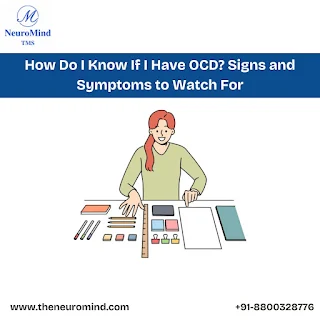The true symptoms of OCD or simply obsessive-compulsive disorder can be both overwhelming as well as draining. Here, Anxiety, compulsions, & recurrent thoughts frequently interfere with daily functioning, & make even easy tasks a lot more challenging. Many individuals wonder Can OCD Be Cured Permanently or if it can be cured at all. Well, Understanding the different therapy options available might deliver much-needed clarity because the reality is more complicated than a simple yes or no.
Let’s go
ahead with what exactly an OCD is:
What
Is OCD?
Well, the mental
illness mainly known as obsessive-compulsive disorder (OCD) is typified by
repetitive behaviors or compulsions, & intrusive thoughts or in other words
obsessions. For instance, someone may feel obligated to wash their hands on a
frequent basis, check their locks different times, or look for confirmation all
the time. Here, mainly all such actions are totally reactions to person’s extreme
anxiety that he or she feels entirely powerless to control, not habits. In this
scenario, OCD can seriously impair employment, relationships, as well as
general quality of life in case left untreated.
Current
Psychological & Medical Treatments Available:
Even though OCD
is still being studied in different manners, there are quite a number of
successful therapies available in the market today. Here, the most popular
strategy mainly involves around both therapy & occasionally, medication.
This is
what exactly you will find:
1. Cognitive behavioral therapy:
Exposure & Response
Prevention (ERP), a specific type of CBT, is mainly regarded as the gold
standard. This gradually lessens anxiety in terms of assisting individuals in
facing their concerns without resorting to compulsive behaviors.
2. Medication:
In order to support
balance brain chemistry & lessen OCD symptoms, doctors frequently prescribe
few selective serotonin reuptake inhibitors or SSRIs. When utilized in
conjunction with therapy, these can be quite beneficial, particularly in
moderate to extreme cases.
3. Alternative Therapy Options:
When
conventional methods are not really sufficient, mindfulness exercises, support
groups, as well as even cutting-edge therapies like TMS or transcranial
magnetic stimulation are investigated.
Here, it is
always critical to keep in mind that every other patient's treatment is unique.
Because what works for one individual may not work for another, and for this
reasons expert advice can be helpful.
Its Cure vs. Management: Clearly
Understand the Difference!
When someone needs
an answer to query like: "Is It Possible to Cure OCD?" or “Can OCDcure permanently?” Then its answer typically lies in terms of whether the symptoms
completely go away or not.
Because OCD
is now seen as a chronic illness, it is typically not really curable in a
conventional manner. It can, however, be efficiently treated to the level that
symptoms become vanished or quite negligible or even cease to interfere with
daily life.
So, with the regular
therapy, constructive coping mechanisms, as well as sometimes medication, OCD
does not clearly interfere with many individual’s ability to lead successful,
fulfilling lives. This is beneficial to view OCD as something that can be
controlled & maintained, just similar to other chronic health disorders, instead
of a disease with a cure.




